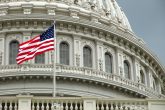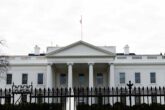October 15, 2020
Working Case Study: Congress and the Iraq Surge
Introduction
The late Senator John McCain and, to a lesser degree, Senators Joseph Lieberman and Lindsey Graham are inextricably linked to the surge—a significant shift in Iraq strategy late in President George W. Bush’s administration. McCain’s endorsement of and support for this policy became part of his brand, particularly against his 2008 presidential campaign opponent, then-Senator Barack Obama. Less widely remembered is how deeply unpopular and long-term his push for more troops for Iraq was, even as the Bush administration took it up, and the role he played in counteracting bipartisan opposition to it. In the wake of a serious midterm electoral defeat, a sober report by the Iraq Study Group, and opposition from senior military officials, an Iraqi surge appeared a highly unlikely strategic choice for Bush. But in a nationally televised address on January 10, 2007, he announced a deployment of an additional 20,000 troops to Iraq focused on counterinsurgency, a proposal the new Democratic congressional leadership was unable to halt.
Less widely remembered is how deeply unpopular and long-term his push for more troops for Iraq was, even as the Bush administration took it up, and the role he played in counteracting bipartisan opposition to it.
McCain himself did not declare victory, but, particularly as his presidential campaign heated up, allies gave him full credit. “Without John McCain, there would never have been the surge,” Graham has repeated.1 Regardless of assessments of the outcome of this strategy, understanding McCain’s long campaign to influence the war in Iraq is worth studying.
Background
Congress authorized the use of force against Iraq in October 2002, an authority President Bush took up six months later on March 20, 2003. Just before the operation began, Army Chief of Staff General Eric Shinseki testified that “something in the order of several hundred thousand soldiers” might be required to secure a postwar Iraq,2 a far smaller estimate than the plan Secretary of Defense Donald Rumsfeld ultimately implemented. Though Shinseki’s remarks stirred controversy at the time, the plan went forward as designed, and Bush famously declared “mission accomplished” on the deck of the USS Abraham Lincoln on May 1, 2003.
Senators Jack Reed, Joseph Biden, and Chuck Hagel all visited Iraq over the summer, finding devastated infrastructure and a precarious security situation.3 McCain visited Iraq for the first time later in August, a trip he and others have detailed as a turning point in his understanding of the conflict there. Their first day was punctuated by a large explosion, what they later learned was a truck bomb that killed U.N. Envoy to Iraq Sérgio Vieira de Mello and many other U.N. personnel. Much of the rest of the trip was made up of highly orchestrated and moderately upbeat briefings that generally supported the present approach to Iraq. But when the group visited Basra, the unexpected happened; the local commander was unavailable, so a British lieutenant colonel escorted the delegation, offering this remark: “Senator, as a British military officer, I’ll never be on a promotions list before the U.S. Senate, I’ll never have to testify before your committee, and I’ll probably never see you again. So I’m going to tell you the unvarnished truth.”4 The lieutenant colonel foretold the violent insurgency that was to come and kickstarted McCain’s long advocacy for more troops, a point he made publicly only days later on National Public Radio.5
McCain took his case for more troops in Iraq to the D.C. national security elites at a time when they were not inclined to hear it, as in a speech at the Council on Foreign Relations.6 These remarks reportedly garnered the attention of Rumsfeld, who brought him to the Pentagon for a meeting, heard him out, and fully disagreed with his assessment. No military leaders were seeking a change in resources or strategy.7
The lieutenant colonel foretold the violent insurgency that was to come and kickstarted McCain’s long advocacy for more troops.
McCain would carry this torch for the next three years, as security conditions deteriorated in Iraq, and few joined his cause in the Senate or House. By early 2006, he had visited Iraq four times on congressional delegations, where he pushed to get out of the traditional perimeters set for him and demanded less rehearsed updates from his briefers. In his repeat visits, he consulted with Iraqi leaders, U.S. embassy officials, military personnel ranging from privates to generals, and many others—including local Iraqis in locations well outside of Baghdad. These visits were punctuated with op-eds: “We should sharply increase the number of troops, including Marines and Special Operations forces, to conduct offensive operations, and add other types of forces, including linguists, intelligence officers and civil affairs officers,” he wrote with Senator Lieberman in 2004.8 He also made his case to the sought-after D.C. insider platform: the Sunday shows. “The question, then, before the American people is, are we ready to quit?” he asked on Meet the Press in November 2006.9 McCain maintained a constant presence on television news programs and gave frequent press briefings.
For years, his messages had consistent but tailored language that lined up with a different insurgency growing inside government: the COINdinistas.10 Always a straight-talking renegade, McCain burnished his reputation for questioning the bright projections and vague assumptions of senior military leaders relaying that the strategy of training Iraqi security forces and search and destroy was accurate, it just needed more time. General David Petraeus, whom McCain had met early on in Iraq, had quietly begun to push against military inertia for a new strategy in drafting what became the Army’s Counterinsurgency [COIN] Field Manual; he later stayed in close touch with McCain as advocacy for the surge strengthened.11 McCain also convened outside experts in his Senate office on a regular basis and was a great consumer of their written products.
Always a straight-talking renegade, McCain burnished his reputation for questioning the bright projections and vague assumptions of senior military leaders relaying that the strategy of training Iraqi security forces and search and destroy was accurate, it just needed more time.
McCain wrote letters to President Bush outlining possible changes in strategy and met frequently with the president and key cabinet officers to press the case. Still, McCain found himself in a delicate place in terms of power dynamics. Having lost the 2000 primary to President Bush, he was not always eager to set himself against the president either publicly or privately, perhaps anticipating a future 2008 race—though he was more comfortable publicly critiquing or confronting Pentagon officials. Colleagues reported that after delegation trips, in briefings with the president, McCain did not always press his case harshly.12 Instead, he carved out a public niche of interrogating and criticizing senior civilian and uniform leaders from the Pentagon, particularly Rumsfeld and General George Casey—a balancing act he maintained while remaining popular among military audiences.
Whether this scrutiny made a difference in the moment is debatable; McCain’s proposed strategy was so widely known and entrenched that few anticipated they could change his mind and may have likewise tuned him out in his series of on-the-ground engagements. But his campaign approach to advocating for a surge in Iraq and unparalleled expertise on the situation on the ground made him a trusted expert among his colleagues, even those who disagreed with him. This long process and positioning put McCain in an opportune place as the deteriorating security situation in Iraq—and the failure of the president’s strategy—became more widely accepted.
In March 2006, Congress initiated the Iraq Study Group. Though few were challenging President’s Bush’s strategy in line with McCain, they were willing to press the assumptions of the Department of Defense (DoD). Iraq Study Group expert Jordan Tama writes that commissions “can be a relatively low-cost way for members of Congress to challenge administration claims about the progress of a war and to introduce alternative proposals into the public debate.”13 By September 2006, multiple informal internal reviews of Iraq strategy had begun at the White House and across the interagency. These gradually morphed into a formal, publicly announced review at National Security Advisor Stephen Hadley’s direction, in parallel to a National Security Council review of the DoD’s surge capacity.
Amid these reviews, the November 2006 midterm elections delivered a sounding rebuke to President Bush and congressional Republicans. The vote was framed as a referendum on Iraq, and polls, along with incoming House leaders, supported this framing.14 The narrative of late 2006 was not only that voters wanted a change in Iraq, they wanted out.
It was clear a change in strategy was forthcoming. Secretary Rumsfeld’s departure was announced shortly after the midterms, and the White House began to look to a December policy announcement. On December 6, the Iraq Study Group echoed the message of voters, recommending a significant strategy change and troop withdrawal. While no solid consensus on strategy existed across parties, there was solid agreement that a change was needed.
Notably, McCain was with Bush in the White House on the day of the release, and, shortly thereafter, McCain departed for one more visit to Iraq. He called the report a recipe for defeat. After his trip, he wrote yet another four-page letter to the president, laying out a detailed recommendation.
While no solid consensus on strategy existed across parties, there was solid agreement that a change was needed.
While it is unclear what made the difference, amid serious political opposition and against the recommendations of the Iraq Study Group, Bush announced the deployment of an additional 20,000 troops to Iraq on January 10, 2007. Weeks later, he announced that Petraeus would replace Casey as the senior military commander in Iraq. McCain did not claim credit for this remarkable sea change, but he undoubtedly played a role.
Throughout the period that followed, McCain and his colleagues fended off various legislative attempts to force the withdrawal of American forces from Iraq and attempted to create political space in which the president and his team could change course. The majority of Americans opposed the surge,15 and members of Congress on both sides of the aisle were quite skeptical. At the time, there was the very real possibility that the surge policy would be strangled in the cradle by a congressional vote to mandate withdrawal, resulting in the president effectively losing the final vestiges of real power.16 Despite this opposition, McCain and his allies Graham and Lieberman were enormously successful at shifting the narrative for Bush. Their methods were not always seen as fair play: the rhetoric of painting anti-surge democrats as anti-military grew in this period and was ultimately effective at subduing opposition.17 McCain asserted that one bipartisan proposal against the surge “amounted to a demoralizing ‘vote of no confidence’ in the American military.” The measure, he said, “criticizes Mr. Bush’s plan to add 21,500 troops in Iraq yet offers no concrete alternatives.”18 In a later assessment, “Graham recalled the numerous bipartisan attempts, including one led by the Republican defense stalwart John Warner, to bring the war to a quick close: ‘there were nine different plans, and we beat the shit out of them. I love John Warner, but we just beat the shit out of him.’”19 The McCain, Graham, and Lieberman alliance held, putting down several initiatives to prevent the surge.
Takeaways
“Without John McCain, there would never have been the surge,”20 Senator Graham has repeated, and later critics of the strategy regularly apply the McCain brand to the troop increase.21 Whether or not the strategy itself was sound, the intensive campaign employed by McCain and his allies is an important case of how members of Congress can influence executive decisions on the conduct of military operations—often against popular opinion and senior Pentagon recommendations.
Whether or not the strategy itself was sound, the intensive campaign employed by McCain and his allies is an important case of how members of Congress can influence executive decisions on the conduct of military operations—often against popular opinion and senior Pentagon recommendations.
CODELs: Travel to Iraq—and specifically travel in which the senator challenged the assumptions and the agenda of his handlers—played a critical role in shaping his views on the security situation and the detailed surge proposal he put forward. During his travel, McCain made a point to reach out to a wide range of stakeholders who would give him alternative perspectives that the official narrative would not. Beyond shoring up his own expertise, his dedication heightened his reputation among his colleagues as a solid and respected resource on Iraq, even among those who disagreed with him.
Alternative strategy: Senator McCain was effective in shaping Bush’s Iraq posture not only due to his criticism, but due to his specific, implementable, and narratively shaped alternative proposals. Through his networks he developed a body of experts in and out of government who contributed to his thinking and backed his surge approach. He advocated not simply for more American troops in Iraq, but also detailed a new approach for them and even where they might be deployed.
Political opportunity: Senator McCain took advantage of what appeared to be a massive sense of momentum toward Iraq withdrawal to make his surge proposal seem realistic and viable. At the moment that the present strategy in 2006 was not working, he had a wide range of allies, and used their messaging and platforms to advance his alternative. This gave President Bush a positive option to advance, rather than placing him in the position of appearing to cave to the Democratic midterm win.
Learn More
CNAS initiated a project to explore in depth the weakening of a key foundation of American democracy: Constitution grants Congress, not the president, the power to declare war. The project has five components: Congress's Hidden Strengths, which examines the range of informal tools available to Congress; working case studies highlighting successful (and less successful) congressional engagement on and regulation of military operations; a report exploring formal legislative and procedural revisions to congressional war powers; an assessment of public opinion on the legislature’s role in war making; and a review of lessons learned from war powers debates among key American allies. The author would like to thank The William and Flora Hewlett Foundation for its generous support of this project.
Congress’s Hidden Strengths
Introduction On matters of peace and war, virtually no one seems satisfied with Congress. Constitutionally coequal to the executive, the Congress often appears more an uneasy ...
Working Case Study: Congress’s Oversight of the Tongo Tongo, Niger, Ambush
There was no question that U.S. forces under attack should be in a position to defend themselves. But the larger question was what sort of mission had placed them in this circ...
Working Case Study: Congressional Influence on the Decision to Intervene in Somalia
Contrary to conventional wisdom, television news did not drive U.S. policy toward Somalia; U.S. lawmakers provided the impetus and credibility for coverage....
- “McCain turns Bush on Iraq war surge,” The Washington Times, August 21, 2008, https://www.washingtontimes.com/news/2008/aug/21/mccain-turns-bush-on-iraq-war-surge/. ↩
- “Pentagon Contradicts General on Iraq Occupation Force’s Size,” The New York Times, February 28, 2003, https://www.nytimes.com/2003/02/28/us/threats-responses-military-spending-pentagon-contradicts-general-iraq-occupation.html. ↩
- Robert Draper, “Prisoner of War,” GQ, September 1, 2008, https://www.gq.com/story/john-mccain-president-iraq-war. ↩
- Draper, “Prisoner of War.” ↩
- Alex Chadwick and Senator John McCain, “Iraq Car Bombing Kills Shiite Cleric,” National Public Radio, August 29, 2003, https://www.npr.org/templates/story/story.php?storyId=1415453. ↩
- Senator John McCain, “U.S. Policy in Iraq,” Council on Foreign Relations, November 5, 2003, https://www.c-span.org/video/?178978-1/us-policy-iraq. ↩
- “McCain turns Bush on Iraq war surge.” ↩
- John McCain and Joe Lieberman, “What Must Come Next,” The Washington Post, May 16, 2004, https://www.washingtonpost.com/archive/opinions/2004/05/16/what-must-come-next/7db2c9f8-f92d-4d1f-a80a-5427a2c0741e/. ↩
- John M. Broder, “In Call for More Troops, McCain Places His Bet on Iraq,” The New York Times, November 14, 2004, https://www.nytimes.com/2006/11/14/washington/14mccain.html. ↩
- Thanassis Cambanis, “How We Fight,” The New York Times, January 24, 2013, https://www.nytimes.com/2013/01/27/books/review/fred-kaplans-insurgents-on-david-petraeus.html. ↩
- Draper, “Prisoner of War.” ↩
- Draper, “Prisoner of War.” ↩
- Jordan Tama, “The Power and Limitations of Commissions: The Iraq Study Group, Bush, Obama, and Congress,” Onlinelibrary.wiley.com, January 11, 2011, https://onlinelibrary.wiley.com/doi/abs/10.1111/j.1741-5705.2010.03834.x. ↩
- Adam Nagourney and Megan Thee, “With Election Driven by Iraq, Voters Want New Approach,” The New York Times, November 2, 2006, https://www.nytimes.com/2006/11/02/us/politics/02poll.html?ex=1320123600&en=307df668f49e0b07&ei=5088&partner=rssnyt&emc=rss. ↩
- “Fox News Poll: Most Think Troop Surge is Bush’s Last Chance in Iraq,” Fox News, January 18, 2007, https://www.foxnews.com/story/fox-news-poll-most-think-troop-surge-is-bushs-last-chance-in-iraq.amp. ↩
- Stephen Benedict Dyson, “George W. Bush, the Surge, and Presidential Leadership,” Political Science Quarterly, 125 no. 4 (2010), 557–585, www.jstor.org/stable/25767090. ↩
- Kelly McHugh, “A Tale of Two Surges: Comparing the Politics of the 2007 Iraq Surge and the 2009 Afghanistan Surge,” Journals.sagepub.com, December 16, 2015, https://journals.sagepub.com/doi/full/10.1177/2158244015621957. ↩
- Hope Yen, “McCain Says Anti-Surge Resolution Demoralizes GIs in Iraq,” The New York Sun, February 5, 2007, https://www.nysun.com/national/mccain-says-anti-surge-resolution-demoralizes-gis/48026/. ↩
- Draper, “Prisoner of War.” ↩
- “McCain turns Bush on Iraq war surge.” ↩
- Jeffrey Goldberg, “The Wars of John McCain,” The Atlantic, October 2008, https://www.theatlantic.com/magazine/archive/2008/10/the-wars-of-john-mccain/306991/; Matt Bai, “The McCain Doctrines,” The New York Times Magazine, May 18, 2008, https://www.nytimes.com/2008/05/18/magazine/18mccain-t.html; and Jim Wolf, “Edwards terms Iraq surge ‘McCain doctrine,’” Reuters, January 21, 2007, https://www.reuters.com/article/us-iraq-usa-politics/edwards-terms-iraq-surge-mccain-doctrine-idUSN3130220020070101. ↩
More from CNAS
-
Sharper: National Security in a Divided Congress
Following the 2022 midterm elections, a new U.S. Congress was sworn in, resulting in a divided House and Senate with narrow margins. Key national security legislative items ar...
By Anna Pederson & Cameron Edinburgh
-
Schedule F: An Unwelcome Resurgence
The U.S. government is able to take on high-risk, high-cost ventures—nuclear security, pandemic response, environmental clean-up, food safety, and more—because civil servants ...
By Loren DeJonge Schulman
-
Western Hemisphere Migration is a Long-Term Challenge
Addressing western hemisphere migration should be a national and international priority....
By Carrie Cordero & Cris Ramón
-
The Lawfare Podcast: Klein and Cordero on the Latest FISA Numbers
To discuss the latest in FISA transparency news, the data and what it all means, Benjamin Wittes sat down on Lawfare Live with Carrie Cordero of the Center for a New American ...
By Carrie Cordero







